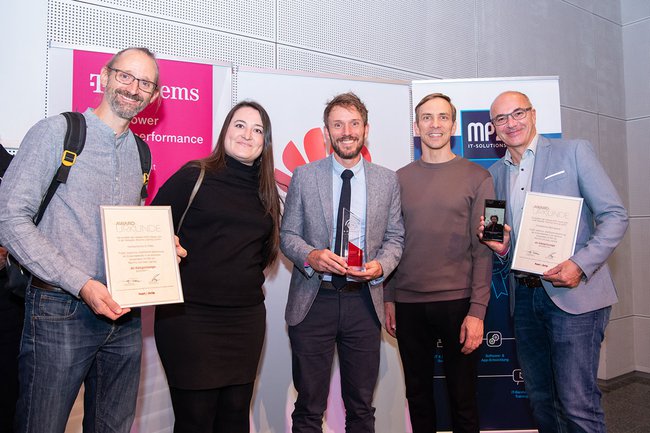eAward for Project “deepForce”
Researchers Receive Award for Project to Provide Faster and More Efficient Help for Knee Arthritis Patients

Photo: (from left to right) Matthias Zeppelzauer (St. Pölten UAS), Quehenberger Viktoria (St. Pölten UAS), Brian Horsak (St. Pölten UAS), Hans Kainz (University of Vienna), Andreas Kranzl (Orthopaedic Hospital Vienna-Speising) © Milena Krobath / eAward
Together with the Orthopaedic Hospital Vienna-Speising, a research team of the St. Pölten University of Applied Sciences has been honoured with the IT business prize “eAward 2024” in the category “Machine Learning and AI”. In the award-winning project “deepForce”, the researchers explore how people suffering from knee arthritis can receive help faster and more efficiently in future.
Researchers of the St. Pölten UAS have received the IT business prize “eAward 2024” in the category “Machine Learning and AI” for their project “deepForce – Pushing the Limits of Rapid Estimation of Knee Joint Contact Force in Clinical Gait Analysis by Machine and Deep Learning”. At the award ceremony on 1 October, the best digitalisation projects from business and administration were honoured.
“Thanks to the results of the project ‘deepForce’, we can accelerate the diagnosis of knee arthritis considerably, thus enabling even more targeted treatment. This is an important contribution to the future-oriented topic of ‘personalised medicine’, and it makes me happy that our research topics are in keeping with the times”, says Barbara Wondrasch, Head of the Institute of Health Sciences and the Department of Health Sciences at the St. Pölten UAS.
“This outcome impressively shows how we can tackle concrete medical challenges using interdisciplinary research and digital technologies”, explains Thomas Moser, Head of the Institute of Creative\Media/Technologies at the St. Pölten UAS.
Understanding Stress on Joints
The instrumented 3D gait analysis (3DGA) is the state of the art in medicine when it comes to the detailed examination of movement mechanisms. More than anything, it can help to better understand the considerable stresses on the joints during walking – which is important information for improving the classification of the arthritis risks for the knee joint. Determining the joint forces, however, usually requires complex and time-consuming computer simulations that are hard to use in a clinical setting.
Artificial Intelligence in Medicine
With the project “deepForce”, our researchers Brian Horsak (Center for Digital Health and Innovation, Institute of Health Sciences), Matthias Zeppelzauer and Slijepčević Djordje (both at the Institute of Creative\Media/Technologies and the Center for Artificial Intelligence), Philipp Krondorfer (Center for Digital Health and Social Innovation), and Viktoria Quehenberger as well as the Orthopaedic Hospital Vienna-Speising solve the problem using a physics-based Deep Learning approach: With the help of 3DGA data, knee contact forces are predicted within seconds.
“The use of AI has enabled us to reduce a time-consuming and sometimes error-prone process in instrumented clinical gait analysis, which would take several hours otherwise, to only a few seconds. This helps us save time and indirectly benefits the patients as well”, says Brian Horsak, Project Head of “deepForce”.
With the help of the Orthopaedic Hospital Vienna-Speising, the anonymised data of more than 1,000 patients and over 12,000 steps were used to train the used AI.
Jury Quotes
- “Double benefit for affected persons and society as healthcare costs are reduced”
- “An excellent use case for AI”
- “Machine Learning provides support where it is needed”
About the Project “deepForce”
The inter-institutional project “deepForce” has been jointly implemented by the St. Pölten University of Applied Sciences, the Orthopaedic Hospital Vienna-Speising, the University of Vienna, the Neuromechanics Research Group KU Leuven (Belgium), and the Johannes Gutenberg University Mainz (Germany) since 2023.
The project receives funding from the Gesellschaft für Forschungsförderung Niederösterreich m.b.H. (Lower Austrian research funding agency).
Further information can be found on the project’s website.
Research Institute and Centres
